


NOVEMBER 2017 EDITION
BETTER BEARD TIP
LIFESTYLE
Movember is a Great Way to Start
by Bill Alley, Broadcast Host, Wordsmith and Beard Advocate
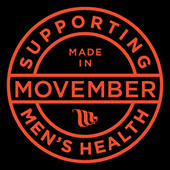 Beard-speak has developed a set of new words and definitions in this century. In all of beard-related lingo, the description of Movember has been a spark that sets normally shaven men to give their razor habit a rest. Thirty days set aside to grow whiskers in order to support a bevy of causes, with most typically related to mens health.
Beard-speak has developed a set of new words and definitions in this century. In all of beard-related lingo, the description of Movember has been a spark that sets normally shaven men to give their razor habit a rest. Thirty days set aside to grow whiskers in order to support a bevy of causes, with most typically related to mens health.
The project got off the ground in 1999 as a fundraiser to help animal welfare in Adelaide, South Australia. By 2004 Movember was prominent in Australia and New Zealand, focusing on prostate cancer and depression. According to Wikipedia, the awareness project spread greatly in 2007 as many European countries, Israel, South Africa, Taiwan and North America raised funds and expanded the type of charity affiliated with growing moustaches, including ways to combat suicide. In 2012 Movember joined the ranks of the 100 top non-government organizations.
Click gray dot for full article.
In Military Life, Clean Shave look Not So Uniform
by Bill Alley, Broadcast Host, Wordsmith and Beard Advocate
You’re going to hear our three honored guests in the Podcast say it, repeatedly: US Special Forces, an outgrowth of the youthful Green Beret look, is the desire a majority of servicemen have. Shaving constantly, especially for the 5 o’clock shadows that appear heavy just after 9am—a few hours after the daily lopping—is a top annoyance of military rigor. They have a constant reminder of those lucky SpecOps1 (Special Forces) teams that train to mingle in with societies in Asia and the Middle East, untouched by cold steel against their whiskers. They dress in fatigues and combat gear, get seen with the sharp sunglasses and head gear and carry much the same rifles to get their job done. The lack of beard for those outside this elite force never goes away...until they detach from military service. One of our interviewees said 90% of men at that moment are either starting to grow or growing their ‘Freedom’ or ‘Operator’ beards.
The Military notes found at Wikipedia have a great synopsis of facial hair rules and standards in many of the leading militia worldwide. Generally speaking, Asian nations (Russia, the Middle East and Central Asia) are more at ease with whiskers on their forces. It mirrors the East/West culture divide of religion and lineage. Europe has had a rich history of facial hair on soldiers and commanders, but conventional warfare rules in the 20th Century brought about changes that began banning some or all forms of it. Within Scandinavia, for instance, there’s more leniency in Norway while Sweden practically bans whiskers.
Click gray dot for full article.
BEARD STORIES
Veterans Claiming the Freedom They Fought For
by Bill Alley, Broadcast Host, Wordsmith and Beard Advocate
There’s a trend I’ve been following for years. Servicemen, across all military branches, have shared with me a very common desire.
The Job—at almost every position—has little room for beards. There are exceptions, and attitudes are changing depending on deployment or commanders allowing whiskers, but if it weren’t for Special Forces units integrating within cultures having the mandate to keep facial hair, the topic and the desire to have the freedom of bearded life would only be a dream. Many who wear the uniform would, if they could, grow and keep facial hair.
This edition of the Gazette is where we honor those who serve and sacrifice, and odd as it sounds, a heart’s desire bears discussion here. It’s something called Freedom Beard... a yearning to put the razor down, reclaiming the essence of one’s manhood borne by each whisker.
Big deal? Yes, it is. Men and women who willingly serve or have been conscripted give up much more than home, family, friends. They give up themselves. Four years, ten years, twenty years, a lifelong career… whatever their aspirations, they’ve put their life on hold, lived it in segments when given a sense of base life normalcy or leave time, all in sworn allegiance to duty for the sake of nation.
In this edition men who served get the chance to speak about their road to finding themselves. If you follow the issues surrounding our vets, many have a tough adjustment leaving military life to return to what we call ‘normal’. The heavy burdens and the deep bond they can’t dismiss creates a tailspin of isolation, frustration, and more.
Click gray dor for full article
Audio Podcast: Thee Vignettes from Vets who Achieved Freedom Beards—Donovan USMC, Michigan; Rob USMC, Wisconsin; Orlando, US Army, Texas
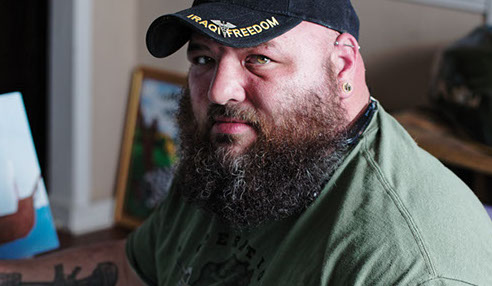
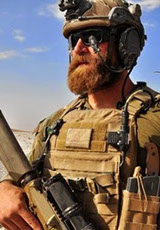
Military Life, Clean Shave look Not So Uniform
by Bill Alley, Broadcast Host, Wordsmith and Beard Advocate
You’re going to hear our three honored guests in the Podcast say it, repeatedly: US Special Forces, an outgrowth of the youthful Green Beret look, is the desire a majority of servicemen have. Shaving constantly, especially for the 5 o’clock shadows that appear heavy just after 9am—a few hours after the daily lopping—is a top annoyance of military rigor. They have a constant reminder of those lucky SpecOps (Special Forces) teams that train to mingle in with societies in Asia and the Middle East, untouched by cold steel against their whiskers. They dress in fatigues and combat gear, get seen with the sharp sunglasses and head gear and carry much the same rifles to get their job done.
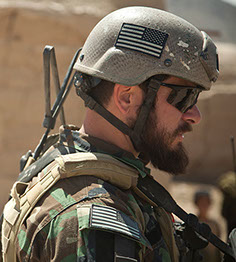
U.S.Service member provides security for Afghan Special Forces Local Police officers April3, 2013 (Wikipedia Commons)
The lack of beard for those outside this elite force never goes away... until they detach from military service. One of our interviewees said 90% of men at that moment are either starting to grow or growing their ‘Freedom’ or ‘Operator’ beards.
The Military notes found at Wikipedia have a great synopsis of facial hair rules and standards in many of the leading militia worldwide. Generally speaking, Asian nations (Russia, the Middle East and Central Asia) are more at ease with whiskers on their forces. It mirrors the East/West culture divide of religion and lineage. Europe has had a rich history of facial hair on soldiers and commanders, but conventional warfare rules in the 20th Century brought about changes that began banning some or all forms of it. Within Scandinavia, for instance, there’s more leniency in Norway while Sweden practically bans whiskers. In the Americas, as in parts of Europe, it depends on what branch of service one holds: sea-faring men and those who serve in the culture-rich Middle and Central Asian battlefields are often allowed full beard status, while religious observance (Jews, Muslims, Sikhs) are given special permission or separate accommodation.
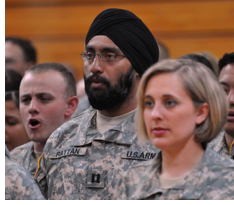
Army Captain Tejdeep Singh Rattan, one of the first Sikh officers in the military since permission was granted to allow beards, long hair, and turbans on active duty. Photo at Officer training, 2010; Photo is Public Domain at Army.mil
Of all the nations who seem to show particular pride in a full bearded regimen of honor, France tends to be the champion of beard reverence. Foreign Legionnaires always had a conscription list of hopefuls, those who would make their getaway from whatever dreary or dire situation they faced to go off and be among the some of the most heralded men in history. It’s only been since this decade that military have been holding out hope that razors would take a permanent ban for a look that still captures saga and allure. The sappeurs hold up a tradition that seem largely ceremonial, but with any decorated division, the histories of war will reveal what the might of soldiers accomplish when the mission requires precision. Here precision enjoys legendary status.
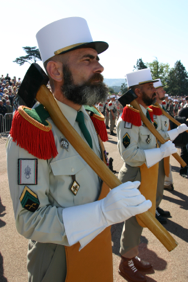
Pioneers of the French Foreign Legion; Public Domain (Author ‘davric’, originated in France.)
x
Movember is a Great Way to Start
by Bill Alley, Broadcast Host, Wordsmith and Beard Advocate
Beard-speak has developed a set of new words and definitions in this century. In all of beard-related lingo, the description of Movember has been a spark that sets normally shaven men to give their razor habit a rest. Thirty days set aside to grow whiskers in order to support a bevy of causes, with most typically related to mens health.
The project got off the ground in 1999 as a fundraiser to help animal welfare in Adelaide, South Australia. By 2004 Movember was prominent in Australia and New Zealand, focusing on prostate cancer and depression. According to Wikipedia, the awareness project spread greatly in 2007 as many European countries, Israel, South Africa, Taiwan and North America raised funds and expanded the type of charity affiliated with growing moustaches, including ways to combat suicide. In 2012 Movember joined the ranks of the 100 top non-government organizations.
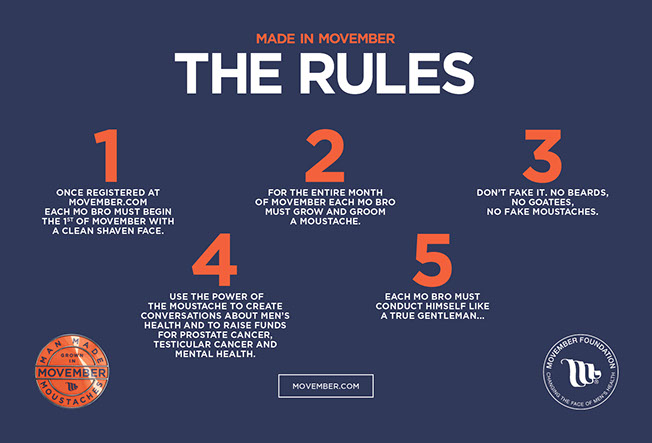
Adopting the cause, first responders (fire, police) have taken on the grow challenge. Beard organizations also promote Movember among the many ways they give to charities—and just about every Beard & Moustache Club contributes to causes like Movember all year long.
Workplaces have also found men who accept the challenge. As of this publishing we’re just beginning the Movember challenge, here is how you and your co-workers, friends and teammates can whisker up for a good cause. First, pick a charity; gather a team to commit to a fundraising goal; and for all those who participate, have some impartial judging go on at the end of the month for the most impressive moustache. That could happen at a social club or pub, which would make for a fun and engaging evening!
x
Veterans Claiming the Freedom They Fought For
by Bill Alley, Broadcast Host, Wordsmith and Beard Advocate
There’s a trend I’ve been following for years. Servicemen, across all military branches, have shared with me a very common desire.
The Job—at almost every position—has little room for beards. There are exceptions, and attitudes are changing depending on deployment or commanders allowing whiskers, but if it weren’t for Special Forces units integrating within cultures having the mandate to keep facial hair, the topic and the desire to have the freedom of bearded life would only be a dream. Many who wear the uniform would, if they could, grow and keep facial hair.
This edition of the Gazette is where we honor those who serve and sacrifice, and odd as it sounds, a heart’s desire bears discussion here. It’s something called Freedom Beard...a yearning to put the razor down, reclaiming the essence of one’s manhood borne by each whisker.
Big deal? Yes, it is. Men and women who willingly serve or have been conscripted give up much more than home, family, friends. They give up themselves. Four years, ten years, twenty years, a lifelong career… whatever their aspirations, they’ve put their life on hold, lived it in segments when given a sense of base life normalcy or leave time, all in sworn allegiance to duty for the sake of nation.
In this edition men who served get the chance to speak about their road to finding themselves. If you follow the issues surrounding our vets, many have a tough adjustment leaving military life to return to what we call ‘normal’. The heavy burdens and the deep bond they can’t dismiss creates a tailspin of isolation, frustration, and more.
This century has taken Veterans issues soberly. Vets who got through addictions, vagrancy, mental anguish and attempts to end their lives obtained help and success, re-bonded with fellow service comrades, and drove their plight into the mainstream. Those who never gave up on them—caregivers, friends, ministers, families, medical professionals and Americans who mean what they say when thanking a Vet for their service to country—comprise a significant cushion of support. However, our soldiers are ‘can do’ people, reliant on strengths from within and as a band of brothers and sisters, a platoon, a mission, their success became ours. Their cost in life, mind, heart and limb became their other battle. It is hard to disclose their experiences and harder for us to assume we would be able to warp our minds around their spiritual, emotional and physical wounds. A Vet may believe protecting us from their pain protects them from their toughest battle; others just try to bury those years in a myriad of ways.
Vets lean best on other vets. They understand, they’ve been in those trenches. The attempt to get this story on the freedom of growing a beard has been treated with immense respect. Freedom beards, as vets have said, are often the first step a man takes in becoming the true male inside, without the restrictions and with every intent to keep those whiskers in the fashion and appearance they decide. I can think of no other individuals who have earned more liberty to free themselves than the liberators that stand between us and harm’s way.
Three stories are found in this segment on SoundCloud. Donnovan in Michigan and Rob from Wisconsin are Marines; Orlando in Texas served in the Army in Texas. Three men, three beards, three perspectives...and each tie to the common themes of freedom, respect and charitable service that takes the militia man into a common battlefield. Whether finding support in helping fellow veterans, being the man of the moment to assist others in dire emergency, or taking on the challenge of discovering the man inside growing out—whiskers first—their recall lends to the stories of many others about what it takes to reclaim one’s life, duty and mission while continuing to serve others profoundly.
x
2019
2018
2017
2016
ISSUE ARCHIVE
x
